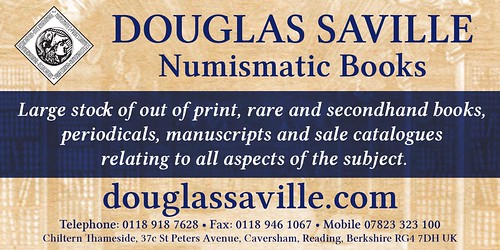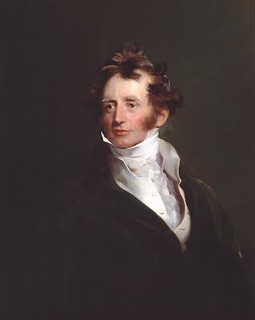
PREV ARTICLE
NEXT ARTICLE
FULL ISSUE
PREV FULL ISSUE
ROBERT GILMOR, JR. (1774-1848)John Lupia submitted the following information from the online draft of his Encyclopedic Dictionary of Numismatic Biographies for this week's installment of his
series. Thanks! As always, this is an excerpt with the full article and bibliography available online. This week's subject is Robert Gilmor, Jr. -Editor
Robert Gilmor, Jr., was a Baltimore merchant, ship owner, East India importer, and a collector of art, rare books, autographs, coins, stamps, natural antiquities including geological specimens and minerals, antiquities, and various curiosities. Lance Lee Humphries has shown that Gilmor was one of the most significant art collectors and patrons in the United States during his lifetime. When sixteen he began collecting coins in 1790. In 1799, he and his brother William became partners in the family firm of Robert Gilmor & Sons. From 1800 - 1801, he went on the Grand Tour visiting Scotland, England, Belgium, France, Holland, Italy, Germany, Austria, and Prussia. Some of the correspondence to his brother William (1775-1829), is now in the Maryland Historical Society, Library. On June 1, 1802, he married Elizabeth Suzanna Cooke (1783-1803). She died on May 5, 1803. On April 9, 1807, he married Sarah Reeve Ladson (1790-), daughter of Major James Henry Ladson (1753-1812), Lieutenant -Governor of South Carolina, and Judith Smith Ladson of Charleston, South Carolina. Both Robert and Sarah Gilmor had their portraits made by Thomas Sully (1783-1872), which now are in the Gibbes Museum, Charleston, South Carolina. In 1821, he had various coins and medals shipped to him at the New York Customs House, and received by his agent, Mr. Bogard. Orosz has astutely speculated Bogard is actually Bogert, which may very well be correct. Also about this date he developed close connections at the United States Mint in Philadelphia. One of his chief aims through these connections was to amass an exhaustive collection of all U. S. Mint type coins. Even with his connections we learn that some twenty years later this was close but still not as yet complete. September 1821, Gilmor was responsible for the second medal ever produced by the United States Mint made to celebrate the golden wedding anniversary of his parents who were married on September 25, 1771. It was designed by the English portrait artist, Benjamin Rawlinson Faulkner (1787-1849). There is an estimated 75 known specimens of this medal in various collections. Bangs & Merwin sale probably catalogued by Ed Cogan of the cabinet of J. N. T. Levick sold one on May 31, 1865, lot 393; Ed Cogan sale on January 24-28, 1876, lot 921; Ebenezer Locke Mason, Jr., sale of the Smith Cabinet, October 7, 1880, lot 58; Joseph Burleigh, Jr., auction on March 7, 1881, lot 37; George W. Massamore auction held September 21, 1882, lot 451; S. H. & H. Chapman auction on June 14, 1884, lot 703; W. E. Woodward sold one at auction on October 13-18, 1884, lot 1221, and Edouard Frossard sold one at auction on October 23, 1884, lot 702; New York Coin & Stamp sale January 24, 1890, lot 1852; Edouard Frossard sold another at auction on September 20, 1890, lot 497; S. H. & H. Chapman sold another in the estate of the late George W. Massamore auction April 12, 1899, lots 426 & 427; Henry Chapman, Jr sale December 22-23, 1915, lot 1370, and so on. In 1838, Gilmor advocated Washington, D. C., to become a center of art and culture hoping to have his art collection housed there which included his coins. He was able to inspire and encourage the establishment of the United Stated Mint Cabinet of Coins. In 1841, he amassed nearly a complete collection of all United States the various type coins and included a 1787 Brasher doubloon. His original plan was to bequeath or donate his collections to the newly formed National Institute for the Promotion of Science, which he was involved in its founding. Unfortunately, the National Institute for the Promotion of Science did not persist over time and dissolved. Gilmor hoped the Smithsonian Institute would purchase his vast art and antiquities collections that included his U. S., foreign and rare ancient coins. When they declined he was forced to sell privately. According to the implications of Emmanuel Joseph Attinelli's account, Gilmor had sold specimens of his originally much larger collection of ancient coins at private sales at an earlier period prior to his demise in November 1848. He died of protracted pulmonary disease at 8 A.M. on Thursday, November 30, 1848, at Baltimore, Maryland. The Rober Gilmor, Jr., coin auction sale is the thirteenth coin auction sale known in American history by Attinelli at that time, i.e., December 1875. Gilmor's is the sixth identity recorded of the earliest consignors in American history known by Attinelli. Whereas, in the John N. Lupia, III, list, the revised edition of Attinelli, Gilmor is the 141st auction known in America and the 41st known identity of a consignor. On May 26-28, 1862 William Harvey Strobridge catalogued and sold the William A. Lilliendhal collection that included the 1793 Chain Link Cent known as the Gilmor Cent. This is the pedigree Atinelli referred to of coins circulating with provenance from the Gilmor collection also referred to as Gilmorata. To read the complete article, see:
 Wayne Homren, Editor The Numismatic Bibliomania Society is a non-profit organization promoting numismatic literature. See our web site at coinbooks.org. To submit items for publication in The E-Sylum, write to the Editor at this address: whomren@gmail.com To subscribe go to: https://my.binhost.com/lists/listinfo/esylum All Rights Reserved. NBS Home Page Contact the NBS webmaster 
|
